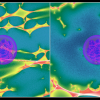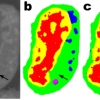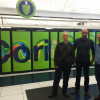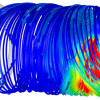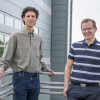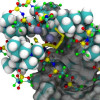News
Combination of Old and New Yields Novel Power Grid Cybersecurity Tool
An R&D project led by Berkeley Lab researchers that combines cybersecurity, machine learning algorithms and commercially available power system sensor technology to better protect the electric power grid has sparked interest from U.S. utilities, power companies and government officials. Read More »
Can Strongly Lensed Type Ia Supernovae Resolve One of Cosmology’s Biggest Controversies?
Using the SciDAC developed SEDONA code and NERSC supercomputers, astrophysicists at Berkeley Lab and the University of Portsmouth discovered how to control the effects of "microlensing." Armed with this knowledge they believe they will be able to find 1000 strongly lensed Type Ia supernovae in real-time from LSST data--that's 20 times more than previous expectations. Read More »
Interested Staff Invited to Apply to Attend 5-Day Machine Learning Hackathon
Staff in the lab's Computing Sciences and Biosciences areas are invited to participate in a weeklong workshop focusing on machine learning in data science. The goal of the workshop, to be held April 2-6, is to build bridges between Computing Sciences and Biosciences through a common foundation in statistical computing. The course is open to all staff in Biosciences and Computing Sciences, but prerequisite training in basic Python, basic linear algebra and basic to intermediate statistics… Read More »
Berkeley Lab “Minimalist Machine Learning” Algorithms Analyze Images from Very Little Data
Berkeley Lab mathematicians have developed a new approach to machine learning aimed at experimental imaging data. Rather than relying on the tens or hundreds of thousands of images used by typical machine learning methods, this new approach “learns” much more quickly and requires far fewer images. Read More »
Physics Data Processing at NERSC Dramatically Cuts Reconstruction Time
In a recent demonstration project, physicists from Brookhaven National Laboratory and Berkeley Lab used the Cori supercomputer to reconstruct data collected from a nuclear physics experiment, an advance that could dramatically reduce the time it takes to make detailed data available for scientific discoveries. Read More »
HPC4Mfg Program Seeking New Project Proposals
The fifth HPC4Mfg program solicitation round, which opened February 1, is seeking concept papers that spur the use of national lab supercomputing resources and expertise to advance innovation in clean energy technology. Read More »
Berkeley Lab Researchers Contribute to Making Blockchains Even More Robust
In the last few years, researchers at Berkeley Lab, UC Davis, and the University of Stavanger in Norway have developed a new protocol, called BChain, which makes private blockchain even more robust. The researchers are also working with colleagues at Berkeley Lab and beyond to adapt this tool to support applications that are of strategic importance to the Department of Energy’s Office of Science. Read More »
Coupling Experiments and Theory to Build a Better Battery
A research team led by Berkeley Lab found that a new lithium-sulfur battery component allows a doubling in capacity compared to a conventional lithium-sulfur battery. Read More »
DOE Announces Latest Round of HPC4Mfg Project Awards
The DOE has announced $1.87 million for seven projects to advance innovation in U.S. manufacturing through high performance computing as part of its HPC4Mfg program. Read More »
Berkeley Lab-led Collaborations Honored for HPC Innovation Excellence
Two Berkeley Lab-led projects—Celeste and Galactos—were honored with Hyperion Research’s 2017 HPC Innovation Excellence Award for "the outstanding application of HPC for business and scientific achievements." Read More »







 Instagram
Instagram YouTube
YouTube
